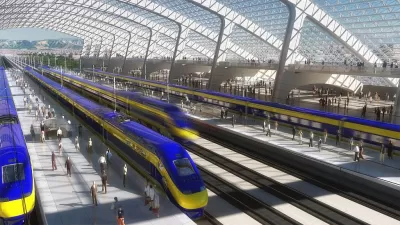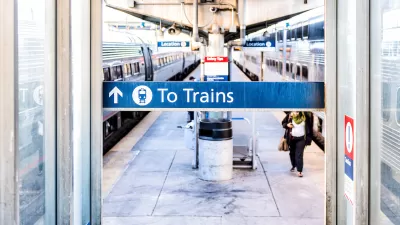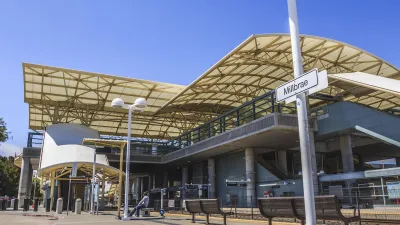If state lawmakers can agree to support matching funds for the project, California's high-speed rail could compete for $36 billion in new federal grants.

The $36 billion in federal high-speed rail grants passed in the infrastructure bill could help California accelerate its high-speed rail project, writes Roger Rudick. "For some perspective on California’s ability to compete for federal high-speed rail funds: in 2009, California’s project was awarded $3.5 billion from an $8 billion federal high-speed rail package. And that was when the project was still just a bunch of blueprints," Rudick says.
The project, currently under construction in California's Central Valley, has faced delays and opposition from lawmakers who disagree with the planned route or want the funds spent on improving local transit instead, obstructing state funding needed to match federal grants. According to Rudick,
That’s why the biggest remaining challenge to completing the project is the Democrat majority state legislature. Assemblymembers Anthony Rendon and Laura Friedman, ironically, don’t seem to want the project to ever reach their own constituents in Los Angeles. Currently, they are holding up over $4 billion in voter-approved bond money for the project, which was allocated by Governor Newsom but rejected by these legislators.
Rudick calls for state legislators to support high-speed rail and release the funds needed to move the project forward, commit to electric trains, and compete for a slice of the new federal funding.
FULL STORY: Feds Pass Downpayment for Next Phase of California High-Speed Rail

Planetizen Federal Action Tracker
A weekly monitor of how Trump’s orders and actions are impacting planners and planning in America.

San Francisco's School District Spent $105M To Build Affordable Housing for Teachers — And That's Just the Beginning
SFUSD joins a growing list of school districts using their land holdings to address housing affordability challenges faced by their own employees.

The Tiny, Adorable $7,000 Car Turning Japan Onto EVs
The single seat Mibot charges from a regular plug as quickly as an iPad, and is about half the price of an average EV.

Seattle's Plan for Adopting Driverless Cars
Equity, safety, accessibility and affordability are front of mind as the city prepares for robotaxis and other autonomous vehicles.

As Trump Phases Out FEMA, Is It Time to Flee the Floodplains?
With less federal funding available for disaster relief efforts, the need to relocate at-risk communities is more urgent than ever.

With Protected Lanes, 460% More People Commute by Bike
For those needing more ammo, more data proving what we already knew is here.
Urban Design for Planners 1: Software Tools
This six-course series explores essential urban design concepts using open source software and equips planners with the tools they need to participate fully in the urban design process.
Planning for Universal Design
Learn the tools for implementing Universal Design in planning regulations.
Smith Gee Studio
City of Charlotte
City of Camden Redevelopment Agency
City of Astoria
Transportation Research & Education Center (TREC) at Portland State University
US High Speed Rail Association
City of Camden Redevelopment Agency
Municipality of Princeton (NJ)





























